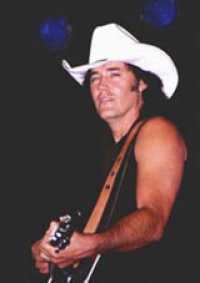David Lee Murphy’s records have an extra kick that makes him instantly identifiable in a crowd of new country artists. Call it a driving rhythm or a no-nonsense attitude or a willingness to push the envelope- it’s an element of his artistry that has produced some of the biggest hit singles of 1995 and 1996, and it’s there on his new MCA album, We Can’t All Be Angels.
Murphy knows exactly how to describe the music of We Can’t All Be Angels. "It’s a rockin’ record," he says. "Mentally, it’s the country message, but as far as the framework goes, it’s got a rockin’ feel to it. ‘Dust on the Bottle’ did, too. All my records have been more rockin’ than normal for Nashville. I like to record music that we’re able to really crank up and rock on live."
For We Can’t All Be Angels Murphy once again teamed up with Nashville’s top producer, Tony Brown. "I can’t talk enough about Tony," Murphy says. "He’s one of those people who brings out the more creative side of an artist. He’s musically in tune. He picks up things in a second that other people will have to listen to over and over. He lets me be me, and he encourages me to stretch out and go out of the boundaries. "
As a former struggling songwriter, Murphy felt at home in a studio from the very beginning of his career as a recording artist. "Since 1983, when it was a big deal to go in and make demos, going into the studio was fun," he explains. "When you write the songs, you just want to go in there and make them come to life. From all those years of making demos and writing songs, I just learned how to make records. You have to when you’re a songwriter because you don’t have a producer telling you what you need to do. It’s survival of the fittest."
Another key element to Murphy’s appeal is that his records have a unique personality—David Lee Murphy’s personality. "I think part of what makes my records stand apart," he explains, "is that I make the arrangements, I play acoustic guitar, I sing, I do the background vocals and I write the songs. "
Murphy’s individuality comes through the strongest on love songs. The first single from We Can’t All Be Angels, "All Lit Up In Love," is a case in point, with its smooth chorus contrasting with a lyric about seeing an ex-lover being "lit up" by someone else. Even the tender expression of love in the ballad "Almost Like Being There" carries an edge of pain and loneliness. With Murphy, the power of love when it’s going right puts a powerful edge on the music, as in "I Could Believe Anything." The concept of "She Don’t Try (To Make Me Love Her)" may be the ultimate in love and respect, but where some artists might be driven to tears, Murphy is driven to rock and rock hard.
Murphy’s talent as a songwriter gives We Can’t All Be Angels an extra degree of depth and variety. He is equally at home singing a haunting duet with himself on "Velvet Lies" or having fun with the rockabilly flavored "Kentucky Girl." He talks like one who’s been there when he gives the advice "Just Don’t Wait Around Til She’s Leavin’." He moves easily from the urgent shuffle beat of "Bringin’ Her Back" to the troubled, unsettling feel of "That’s Behind Me" to the moody depression of "She’s Not Mine." And if anyone wonders why he doesn’t sing a sweet song now and then, he seems to provide an unapologetic answer in "We Can’t All Be Angels."
David Lee Murphy is a classic 10-year overnight success story. He arrived in Nashville in 1983 from Herrin, Illinois, intent on establishing himself as a songwriter so he could have a solid source of material as an artist. He had some success as a writer, with cuts by Reba McEntire, Dobie Gray, and Doug Stone, but most of the time he struggled, traveling around the southeast fronting a honky tonk band and staying true to David Lee Murphy. "I was just a struggling, flat-broke songwriter," he recalls, "but living that lifestyle was doing what I wanted to do. Even when I didn’t make much money I was happy because I was working toward something."
Finally, in the fall of 1994, Tony Brown picked Murphy’s song "Just Once" off of a demo tape and put it on the soundtrack of 8 Seconds (the film starring Luke Perry as bull-riding champion Lane Frost). "Just Once" hit, and Murphy went into the studio with Brown to record his first CD Out With a Bang. By the end of 1995 Murphy’s "Party Crowd" was the most-played song ofthe year and "Dust on the Bottle" was his first No. 1. In the meantime, Out With a Bang became the best selling debut album by any male artist in 1995.
On Gettin’ Out The Good Stuff, Murphy’s second album, he stretched his artistic range with a variety of songs, all of which he wrote or co-wrote. "Everytime I Get Around You" and "The Road You Leave Behind" continued his string of hits.
With We Can’t All Be Angels, David Lee Murphy continues to put a rockin’ edge on country music. With strong songs and inspired performances, he has become one of the most important new artists in country music.
